- Home
- Nathaniel Hawthorne
Young Goodman Brown : By Nathaniel Hawthorne - Illustrated Page 2
Young Goodman Brown : By Nathaniel Hawthorne - Illustrated Read online
Page 2
In the interval of silence he stole forward until the light glared full upon his eyes. At one extremity of an open space, hemmed in by the dark wall of the forest, arose a rock, bearing some rude, natural resemblance either to an alter or a pulpit, and surrounded by four blazing pines, their tops aflame, their stems untouched, like candles at an evening meeting. The mass of foliage that had overgrown the summit of the rock was all on fire, blazing high into the night and fitfully illuminating the whole field. Each pendent twig and leafy festoon was in a blaze. As the red light arose and fell, a numerous congregation alternately shone forth, then disappeared in shadow, and again grew, as it were, out of the darkness, peopling the heart of the solitary woods at once.
``A grave and dark-clad company,'' quoth Goodman Brown.
In truth they were such. Among them, quivering to and fro between gloom and splendor, appeared faces that would be seen next day at the council board of the province, and others which, Sabbath after Sabbath, looked devoutly heavenward, and benignantly over the crowded pews, from the holiest pulpits in the land. Some affirm that the lady of the governor was there. At least there were high dames well known to her, and wives of honored husbands, and widows, a great multitude, and ancient maidens, all of excellent repute, and fair young girls, who trembled lest their mothers should espy them. Either the sudden gleams of light flashing over the obscure field bedazzled Goodman Brown, or he recognized a score of the church members of Salem village famous for their especial sanctity. Good old Deacon Gookin had arrived, and waited at the skirts of that venerable saint, his revered pastor. But, irreverently consorting with these grave, reputable, and pious people, these elders of the church, these chaste dames and dewy virgins, there were men of dissolute lives and women of spotted fame, wretches given over to all mean and filthy vice, and suspected even of horrid crimes. It was strange to see that the good shrank not from the wicked, nor were the sinners abashed by the saints. Scattered also among their pale-faced enemies were the Indian priests, or powwows, who had often scared their native forest with more hideous incantations than any known to English witchcraft.
``But where is Faith?'' thought Goodman Brown; and, as hope came into his heart, he trembled.
Another verse of the hymn arose, a slow and mournful strain, such as the pious love, but joined to words which expressed all that our nature can conceive of sin, and darkly hinted at far more. Unfathomable to mere mortals is the lore of fiends. Verse after verse was sung; and still the chorus of the desert swelled between like the deepest tone of a mighty organ; and with the final peal of that dreadful anthem there came a sound, as if the roaring wind, the rushing streams, the howling beasts, and every other voice of the unconcerted wilderness were mingling and according with the voice of guilty man in homage to the prince of all. The four blazing pines threw up a loftier flame, and obscurely discovered shapes and visages of horror on the smoke wreaths above the impious assembly. At the same moment the fire on the rock shot redly forth and formed a glowing arch above its base, where now appeared a figure. With reverence be it spoken, the figure bore no slight similitude, both in garb and manner, to some grave divine of the New England churches.
``Bring forth the converts!'' cried a voice that echoed through the field and rolled into the forest.
At the word, Goodman Brown stepped forth from the shadow of the trees and approached the congregation, with whom he felt a loathful brotherhood by the sympathy of all that was wicked in his heart. He could have well-nigh sworn that the shape of his own dead father beckoned him to advance, looking downward from a smoke wreath, while a woman, with dim features of despair, threw out her hand to warn him back. Was it his mother? But he had no power to retreat one step, nor to resist, even in thought, when the minister and good old Deacon Gookin seized his arms and led him to the blazing rock. Thither came also the slender form of a veiled female, led between Goody Cloyse, that pious teacher of the catechism, and Martha Carrier, who had received the devil's promise to be queen of hell. A rampant hag was she. And there stood the proselytes beneath the canopy of fire.
``Welcome, my children,'' said the dark figure, ``to the communion of your race. Ye have found thus young your nature and your destiny. My children, look behind you!''
They turned; and flashing forth, as it were, in a sheet of flame, the fiend worshippers were seen; the smile of welcome gleamed darkly on every visage.
``There,'' resumed the sable form, ``are all whom ye have reverenced from youth. Ye deemed them holier than yourselves, and shrank from your own sin, contrasting it with their lives of righteousness and prayerful aspirations heavenward. Yet here are they all in my worshipping assembly. This night it shall be granted you to know their secret deeds: how hoary-bearded elders of the church have whispered wanton words to the young maids of their households; how many a woman, eager for widows' weeds, has given her husband a drink at bedtime and let him sleep his last sleep in her bosom; how beardless youths have made haste to inherit their fathers' wealth; and how fair damsels--blush not, sweet ones--have dug little graves in the garden, and bidden me, the sole guest to an infant's funeral. By the sympathy of your human hearts for sin ye shall scent out all the places--whether in church, bedchamber, street, field, or forest--where crime has been committed, and shall exult to behold the whole earth one stain of guilt, one mighty blood spot. Far more than this. It shall be yours to penetrate, in every bosom, the deep mystery of sin, the fountain of all wicked arts, and which inexhaustibly supplies more evil impulses than human power--than my power at its utmost--can make manifest in deeds. And now, my children, look upon each other.''
They did so; and, by the blaze of the hell-kindled torches, the wretched man beheld his Faith, and the wife her husband, trembling before that unhallowed altar.
``Lo, there ye stand, my children,'' said the figure, in a deep and solemn tone, almost sad with its despairing awfulness, as if his once angelic nature could yet mourn for our miserable race. ``Depending upon one another's hearts, ye had still hoped that virtue were not all a dream. Now are ye undeceived. Evil is the nature of mankind. Evil must be your only happiness. Welcome again, my children, to the communion of your race.''
``Welcome,'' repeated the fiend worshippers, in one cry of despair and triumph.
And there they stood, the only pair, as it seemed, who were yet hesitating on the verge of wickedness in this dark world. A basin was hollowed, naturally, in the rock. Did it contain water, reddened by the lurid light? or was it blood? or, perchance, a liquid flame? Herein did the shape of evil dip his hand and prepare to lay the mark of baptism upon their foreheads, that they might be partakers of the mystery of sin, more conscious of the secret guilt of others, both in deed and thought, than they could now be of their own. The husband cast one look at his pale wife, and Faith at him. What polluted wretches would the next glance show them to each other, shuddering alike at what they disclosed and what they saw!
``Faith! Faith!'' cried the husband, ``look up to heaven, and resist the wicked one.''
Whether Faith obeyed he knew not. Hardly had he spoken when he found himself amid calm night and solitude, listening to a roar of the wind which died heavily away through the forest. He staggered against the rock, and felt it chill and damp; while a hanging twig, that had been all on fire, besprinkled his cheek with the coldest dew.
The next morning young Goodman Brown came slowly into the street of Salem village, staring around him like a bewildered man. The good old minister was taking a walk along the graveyard to get an appetite for breakfast and meditate his sermon, and bestowed a blessing, as he passed, on Goodman Brown. He shrank from the venerable saint as if to avoid an anathema. Old Deacon Gookin was at domestic worship, and the holy words of his prayer were heard through the open window. ``What God doth the wizard pray to?'' quoth Goodman Brown. Goody Cloyse, that excellent old Christian, stood in the early sunshine at her own lattice, catechizing a little girl who had brought her a pint of morning's milk. Goodman Brown snatched away the child as from
the grasp of the fiend himself. Turning the corner by the meeting-house, he spied the head of Faith, with the pink ribbons, gazing anxiously forth, and bursting into such joy at sight of him that she skipped along the street and almost kissed her husband before the whole village. But Goodman Brown looked sternly and sadly into her face, and passed on without a greeting.
Had Goodman Brown fallen asleep in the forest and only dreamed a wild dream of a witch-meeting?
Be it so if you will; but, alas! it was a dream of evil omen for young Goodman Brown. A stern, a sad, a darkly meditative, a distrustful, if not a desperate man did he become from the night of that fearful dream. On the Sabbath day, when the congregation were singing a holy psalm, he could not listen because an anthem of sin rushed loudly upon his ear and drowned all the blessed strain. When the minister spoke from the pulpit with power and fervid eloquence, and, with his hand on the open Bible, of the sacred truths of our religion, and of saint-like lives and triumphant deaths, and of future bliss or misery unutterable, then did Goodman Brown turn pale, dreading lest the roof should thunder down upon the gray blasphemer and his hearers. Often, waking suddenly at midnight, he shrank from the bosom of Faith; and at morning or eventide, when the family knelt down at prayer, he scowled and muttered to himself, and gazed sternly at his wife, and turned away. And when he had lived long, and was borne to his grave a hoary corpse, followed by Faith, an aged woman, and children and grandchildren, a goodly procession, besides neighbors not a few, they carved no hopeful verse upon his tombstone, for his dying hour was gloom.

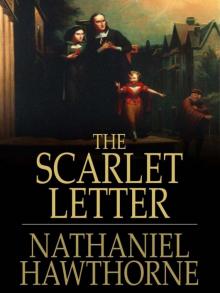 The Scarlet Letter
The Scarlet Letter Young Goodman Brown : By Nathaniel Hawthorne - Illustrated
Young Goodman Brown : By Nathaniel Hawthorne - Illustrated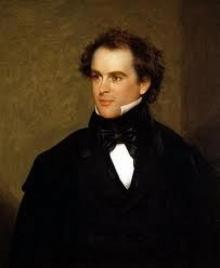 The Birthmark
The Birthmark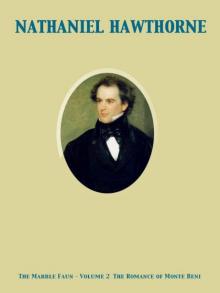 The Marble Faun; Or, The Romance of Monte Beni - Volume 1
The Marble Faun; Or, The Romance of Monte Beni - Volume 1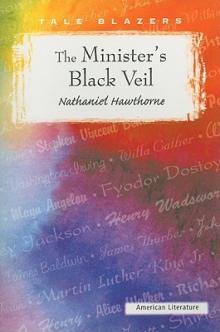 The Minister's Black Veil
The Minister's Black Veil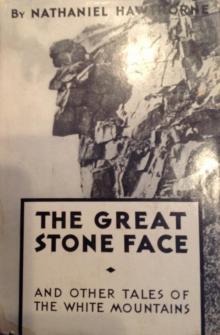 The Great Stone Face, and Other Tales of the White Mountains
The Great Stone Face, and Other Tales of the White Mountains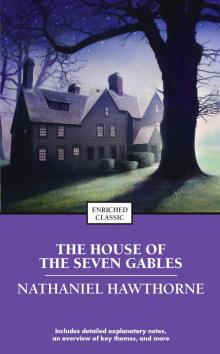 The House of the Seven Gables
The House of the Seven Gables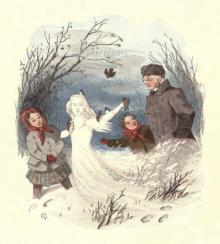 The Snow Image
The Snow Image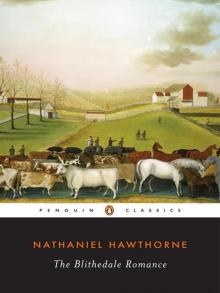 The Blithedale Romance
The Blithedale Romance Rappaccini's Daughter: By Nathaniel Hawthorne - Illustrated
Rappaccini's Daughter: By Nathaniel Hawthorne - Illustrated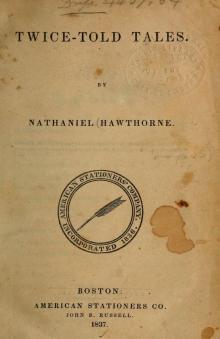 Twice-Told Tales
Twice-Told Tales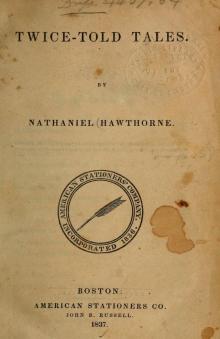 Twice Told Tales
Twice Told Tales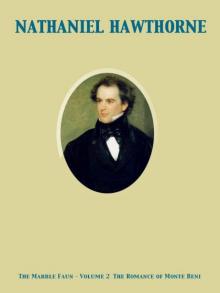 The Marble Faun; Or, The Romance of Monte Beni - Volume 2
The Marble Faun; Or, The Romance of Monte Beni - Volume 2_preview.jpg) Footprints on the Sea-Shore (From Twice Told Tales)
Footprints on the Sea-Shore (From Twice Told Tales)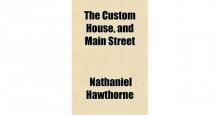 Main Street
Main Street_preview.jpg) The Seven Vagabonds (From Twice Told Tales)
The Seven Vagabonds (From Twice Told Tales) Fanshawe
Fanshawe Chippings with a Chisel
Chippings with a Chisel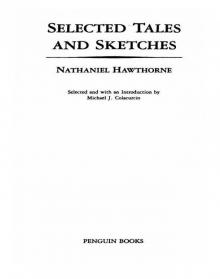 Selected Tales and Sketches
Selected Tales and Sketches Young Goodman Brown
Young Goodman Brown Roger Malvin's Burial
Roger Malvin's Burial The Prophetic Pictures
The Prophetic Pictures The Village Uncle
The Village Uncle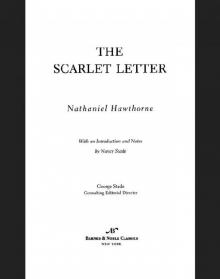 Scarlet Letter (Barnes & Noble Classics Series)
Scarlet Letter (Barnes & Noble Classics Series) The Procession of Life
The Procession of Life Drowne's Wooden Image
Drowne's Wooden Image Hawthorne's Short Stories
Hawthorne's Short Stories My Kinsman, Major Molineux
My Kinsman, Major Molineux Legends of the Province House
Legends of the Province House Foot-Prints on the Sea-Shore
Foot-Prints on the Sea-Shore The Haunted Quack
The Haunted Quack Tanglewood Tales
Tanglewood Tales The Seven Vagabonds
The Seven Vagabonds Mosses from an Old Manse, Volume 2
Mosses from an Old Manse, Volume 2 The Canterbury Pilgrims
The Canterbury Pilgrims Wakefield
Wakefield The Gray Champion
The Gray Champion The White Old Maid
The White Old Maid The Snow-Image: A Childish Miracle
The Snow-Image: A Childish Miracle The Gentle Boy
The Gentle Boy Mr. Higginbotham's Catastrophe
Mr. Higginbotham's Catastrophe![The Threefold Destiny: A Fairy Legend, by Ashley Allen Royce [pseud.] Read online](http://i1.bookreadfree.com/i2/04/10/the_threefold_destiny_a_fairy_legend_by_ashley_allen_royce_pseud__preview.jpg) The Threefold Destiny: A Fairy Legend, by Ashley Allen Royce [pseud.]
The Threefold Destiny: A Fairy Legend, by Ashley Allen Royce [pseud.] Lady Eleanore`s Mantle
Lady Eleanore`s Mantle The Great Carbuncle
The Great Carbuncle The Portable Hawthorne (Penguin Classics)
The Portable Hawthorne (Penguin Classics)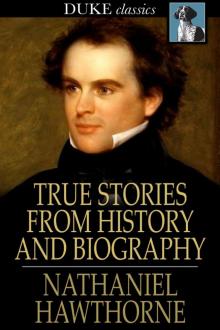 True Stories from History and Biography
True Stories from History and Biography